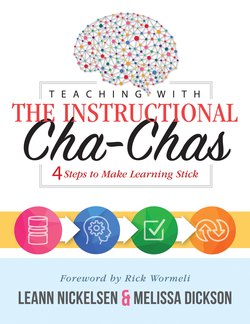Читать книгу Teaching With the Instructional Cha-Chas - LeAnn Nickersen - Страница 6
На сайте Литреса книга снята с продажи.
ОглавлениеTable of Contents
Reproducible pages are in italics.
About the Authors
Foreword by Rick Wormeli
INTRODUCTIONManeuver Your Footwork With Four Steps
This Book’s Focus
This Book’s Strategies
This Book’s Organization
Part I: Setting Up Your Classroom Dance Floor
CHAPTER 1Choreograph Your Instruction With the Cha-Chas Steps
What Does Neuroscience Say About Learning?
What Is the Formative Assessment Process?
What Are the Characteristics of the Formative Assessment Process?
Is There Research to Support the Formative Assessment Process?
What Is Differentiated Instruction?
Is There Research to Support Differentiation?
How Did We Merge Neuroscience, the Formative Assessment Process, and Differentiated Instruction Into Four Steps?
Chunk (Instruct)
Chew (Learn)
Check (Evaluate)
Change (Differentiate)
Summary
CHAPTER 2Move Smoothly From Broad Ideas to Smaller Ideas
How Do You Identify the Standard?
How Do You Identify the Learning Target?
How Do You Choose the Main Formative Assessment?
How Do You Choose Criteria for Success?
Summary
CHAPTER 3Get to Know Your Dance Partners
How Can You Learn About Students?
Why Are Preassessing, Activating Prior Knowledge, Pre-Exposing, and Priming Worthwhile?
Preassessing
Activating Prior Knowledge
Pre-Exposing
Priming
What Strategies Can You Use?
Create-a-Cloze
Self-Evaluation Graffiti Corners
Anticipation Guide
Draw It, Web It, Write It
Knowledge Framing
Find an Expert
Show What You Know
Four-Choice Processing
Kinesthetic Vocabulary
The Big Picture
Summary
Anticipation Guide
Draw It, Web It, Write It
Knowledge Framing Prior to Reading the Text
Find an Expert
Show What You Know
Kinesthetic Vocabulary Cards
The Big Picture
Part II: Putting the Cha-Chas Steps Together
CHAPTER 4Take Step One: Chunk (Instruct)
What Is a Chunk and Why Does the Brain Like It?
How Long Should a Chunk Be?
How Do You Chunk a Daily Lesson?
What Teaching Elements Should Chunks Include?
Lesson Plan With Chunks
Directions
Example
What Strategies Can You Use During Chunking?
Text Chunking
Teacher Think-Aloud
Student Think-Aloud
Big Picture Note-Taking
Chunk Mind Map
Color-Coded Nonfiction Chunking
What? So What? Now What?
Interest Expert Groups Jigsaw
Rotation Stations
Summary
Text Chunking
Partner Reading Checklist—Fiction Strategies
Partner Reading Checklist—Nonfiction Strategies
Big Picture Note-Taking Method
Mind Map Assessment Rubric
What? So What? Now What?
CHAPTER 5Take Step Two: Chew (Learn)
What Is Processing?
Why Does the Brain Need to Process?
What Are the Benefits of Processing?
How Can You Differentiate the Content Processing?
Processing in Homogeneous Groups
Processing in Heterogeneous Cooperative Learning Groups
Lesson Plan With Chew Points
Directions
Example
Suggestions for Differentiation
Suggestions to Incorporate Technology
What Strategies Can You Use During Chewing?
Question Stars From Bloom’s Taxonomy Levels
Think Notes
Framing Opinions With SOS
Framing Arguments
Talking Chips
Swap-a-Question
Stop-Think-Write
Reciprocal Teaching
Thirty-Second Expert
Chalk Talk, Wisdom Walk
Conversation Starters
Summary
The Main Idea and Detail Tabletop Graphic Organizer
Question Stars for Bloom’s Taxonomy Level One—Knowledge
Question Stars for Bloom’s Taxonomy Level Two—Comprehension
Question Stars for Bloom’s Taxonomy Level Three—Application
Question Stars for Bloom’s Taxonomy Level Four—Analysis
Question Stars for Bloom’s Taxonomy Level Five—Evaluation
Question Stars for Bloom’s Taxonomy Level Six—Synthesis
Think Notes
Framing-an-Argument Organizer
Talking Chips Explanation
Talking Chips Pieces
Swap-a-Question Template
CHAPTER 6Take Step Three: Check (Evaluate)
Why Is Checking for Understanding Worthwhile?
How Do You Differentiate the Product With Checkpoints and Feedback?
What Evidence Are You Checking?
How Can You Respond to the Many Checkpoints?
How Can You Give More Powerful Verbal Feedback?
Where Am I Going?
Where Am I Now?
How Do I Get Closer to the Goal? How Do I Close the Gap?
Lesson Plan With Added Checkpoints
Directions
Example
Suggestions for Differentiation
Suggestions to Incorporate Technology
What Strategies Can You Use During Checking?
All-Student Response Quick-Check Tools
Seven-Step Feedback
Feedback Cue Cards
Multiple Intelligence Closure
Exit Tickets
Dynamic Duo Feedback
Praise-Question-Polish+
Fix-It Activities
Daily Learning Target Check
Student Self-Assessment and Goal Setting
Summary
Feedback Cue Cards
Exit Ticket Templates—Version One
Exit Ticket Templates—Version Two
Fix-It Activity Tally Page for Grades K–3
Fix-It Activity Tally Page for Grades 4–8
Daily Learning Target Self-Assessment—Version One
Daily Learning Target Self-Assessment—Version Two
Exam Error Breakdown
Rubric for Self-Assessment and Goal Setting
Reading Strategy Goals Bookmark
CHAPTER 7Take Step Four: Change (Differentiate)
What Common Changes Exist?
How Can You Find the Time for Change?
How Do You Use Data to Determine What Change to Make?
What Strategies Can You Use During Change?
Flexible Grouping
Preteaching
Reteaching
Tiered Assignments
Learning Stations
Student-Driven Inquiry Learning
Summary
Teacher Checklist for Grouping
Group Evaluation Sheet
Learning Station–Planning Template
Learning Station Self-Assessment Template
Jump-Start Inquiry or Passion Projects Brainstorming
Credible and Accurate Resource Tracker
Criteria for Success Cards
Student Personal Accountability and Reflection Guide
Student Effort Self-Assessment
CHAPTER 8Finesse the Chunk, Chew, Check, and Change Cycle: A Beautiful Classroom Dance
Classroom Scenarios
Scenario One
Scenario Two
Cheat Sheet for Planning With the Instructional Cha-Chas Cycle
Self-Assessment for Strengths and Growth Opportunities
Summary
Planning With the Instructional Cha-Chas Cycle
Ideas for Bumping It Up
Ideas for Breaking It Down
Daily Lesson Plan
Teacher Self-Assessment for the Instructional Cha-Chas Cycle
EPILOGUESwing Into Action With the Four Steps: Time for Your Solo
References and Resources
Index
